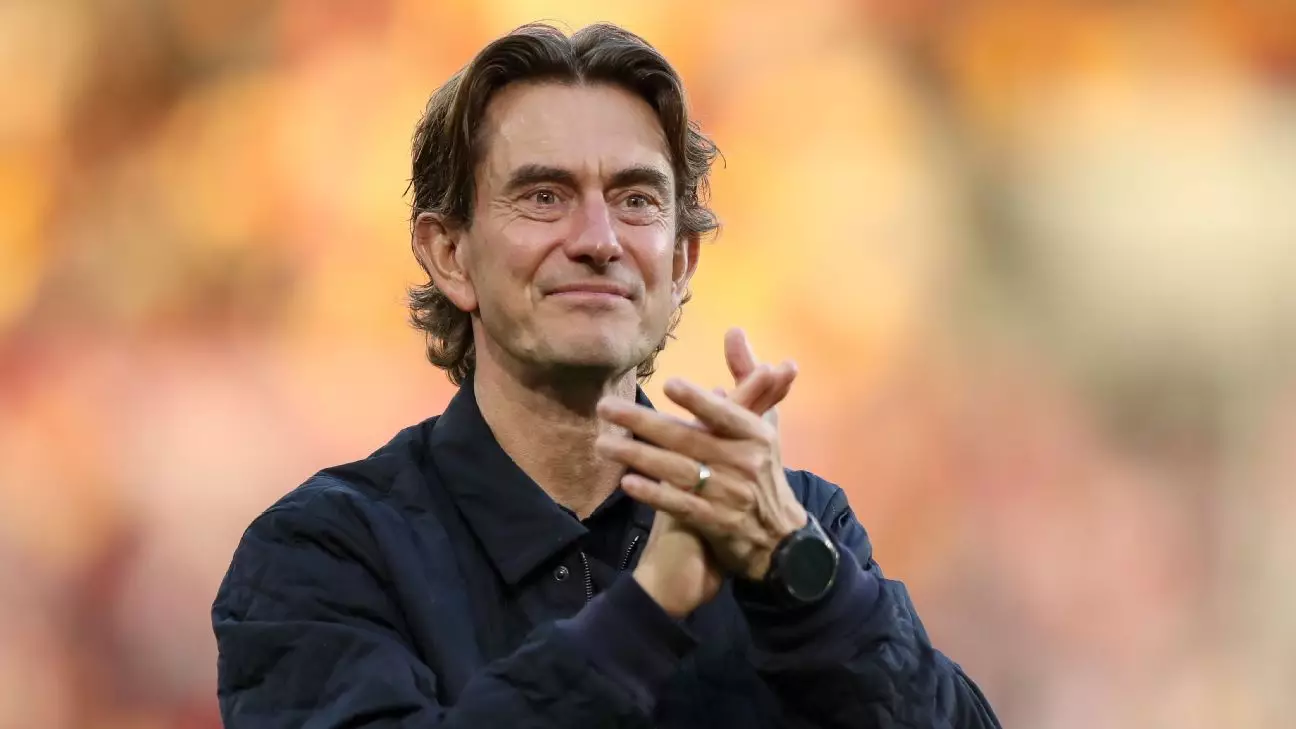Thomas Frank’s recent decision to accept the Tottenham Hotspur managerial role signals more than just another job change; it embodies a conscious embrace of uncertainty and a desire to push personal and professional boundaries. Traditionally, managers tend to seek stability or proven success, but Frank’s self-described craving for “more risk” demonstrates a refreshing attitude towards leadership in football. His move from Brentford—a club where he achieved considerable success—to one of the most scrutinized and historically significant teams in England, marks a deliberate shift towards embracing the unpredictable nature of top-tier management. Such a bold step suggests Frank’s confidence in his vision and a willingness to operate under pressure, which could either propel him into uncharted greatness or test his resilience in a challenging environment.
Frank’s light-hearted remark about seeking “more risk” might be dismissive at first glance, but it reflects a deeper desire to find fulfillment through challenge and growth. The Premier League, with its relentless intensity, demanding expectations, and high turnover of managers, is a different beast altogether. For Frank to willingly step into this arena indicates a mindset aligned with grit and perseverance, qualities essential for a club like Tottenham. His affirmation that he will have ample time to build a long-term project aligns with the club’s recent rollercoaster of managerial changes. Yet, this patience must be matched with unwavering dedication, as Spurs’ history suggests that patience is often scarce amidst the clamoring for immediate results.
Strategic Optimism and Long-Term Vision Amidst Short-Term Pressure
One of the most compelling facets of Frank’s approach is his optimistic outlook tempered with realism. Having engaged in detailed conversations with key Tottenham stakeholders—Chairman Daniel Levy, CEO Vinai Venkatesham, and Technical Director Johan Lange—Frank conveys a sense of alignment in vision and expectation. His belief that he’s shown enough positivity and potential to earn trust underscores a leadership style rooted in confidence and clarity. But behind the veneer of optimism lies a strategic awareness: Tottenham’s current standing is far from title contention, and the path forward involves patience, incremental progress, and a clear perspective on what success truly entails.
Frank’s emphasis on “long-term” planning reveals a mindset that refuses to succumb to transient pressures. In an era where fleeting success often results in managerial sackings, his commitment to stability and development may set him apart. While Tottenham’s recent record of sacking five managers highlights the club’s instability, Frank’s willingness to challenge that cycle demonstrates a belief in a different approach—one where continuous growth and resilient planning precede immediate triumphs. His acknowledgment that teams like Manchester City, Arsenal, and Liverpool are currently ahead in the pecking order also exemplifies a realistic understanding that leapfrogging these giants requires patience, fortitude, and meticulous work.
Building a Cohesive Squad: Navigating Future Uncertainties with Confidence
The potential departure of key players like Son Heung-Min and Cristian Romero threatens to destabilize Tottenham’s evolving squad. Yet, Frank’s measured response to rumors surrounding these players displays a focus on the collective rather than individual narratives. By not making definitive statements about captaincy or player retention, he emphasizes a pragmatic approach rooted in thorough evaluation rather than reactive decision-making. His focus remains on what is within his control: fostering a professional environment where players perform at their best, regardless of external speculation.
Son’s status as a seasoned leader and Romero’s importance to the team are acknowledged, but Frank positions them within the context of ongoing assessments. His statement that “all the players are here” and are training hard suggests a belief in process over speculation. Such a stance conveys confidence in the squad’s current standards and an optimistic vision of continuity—contingent, of course, on how decision-making unfolds in the coming months.
Furthermore, Frank’s decision to assign team captains temporarily during upcoming matches highlights his willingness to evaluate leadership free from tradition or precedent. This pragmatic approach indicates a coach who values performance and professionalism over titles, a mindset essential for nurturing a resilient squad capable of adapting to change and adversity.
Why Frank’s Boldness Signals a New Chapter for Spurs
Ultimately, Thomas Frank’s arrival at Tottenham is a statement of intent. It signals a willingness to challenge the norm, to accept chaos as part of growth, and to prioritize long-term vision over immediate results. His openness about embracing risk, coupled with his clear strategic outlook, paints a picture of a manager ready to reshape a club that has long oscillated between stability and upheaval.
While skepticism is natural—given Tottenham’s turbulent recent history—Frank’s attitude suggests that the club might finally be moving towards a steadier, more deliberate developmental phase. His confident declarations about the importance of patience and his belief that the club’s leadership shares this vision demonstrate a rare harmony of purpose. If Frank can foster consistency and resilience in his squad, Tottenham could emerge from the cycle of managerial merry-go-round into a new era defined by calculated ambition and unwavering resolve.

Leave a Reply